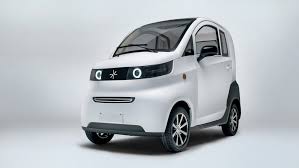
In recent years, the popularity of small electric cars has been on the rise as more and more drivers seek eco-friendly and cost-effective transportation options. These compact vehicles offer a range of benefits that make them an attractive choice for urban dwellers and environmentally conscious individuals.
One of the key advantages of small electric cars is their compact size, which makes them ideal for navigating crowded city streets and fitting into tight parking spaces. Their nimble handling and manoeuvrability make them a practical choice for urban driving, where space is often limited.
Furthermore, small electric cars are known for their low running costs. With lower maintenance requirements and significantly reduced fuel expenses compared to traditional petrol or diesel vehicles, they offer a more economical option for budget-conscious drivers.
Additionally, small electric cars are environmentally friendly, producing zero tailpipe emissions during operation. This makes them a greener alternative to traditional combustion engine vehicles and contributes to reducing air pollution in urban areas.
Despite their compact size, modern small electric cars are equipped with advanced technology and features that ensure a comfortable and convenient driving experience. Many models come with smart connectivity options, safety features, and ample storage space despite their smaller footprint.
As governments around the world increasingly focus on reducing carbon emissions and promoting sustainable transportation solutions, the demand for small electric cars is expected to continue growing. With ongoing advancements in battery technology and infrastructure development, these vehicles are becoming an increasingly viable and attractive option for drivers looking to embrace a greener lifestyle.
In conclusion, small electric cars offer a compelling combination of practicality, affordability, environmental friendliness, and technological innovation. As the automotive industry continues to evolve towards sustainable mobility solutions, these compact electric vehicles are poised to play a significant role in shaping the future of urban transportation.
Frequently Asked Questions About Small Electric Cars in India
- What is the smallest electric car in India?
- What is the smallest EV car in India?
- What’s the average price of a small electric car?
- What is the price of mini EV electric car?
- Is it worth buying a small electric car?
What is the smallest electric car in India?
One of the frequently asked questions in India’s electric car market is, “What is the smallest electric car available?” The Tata Nano EV stands out as one of the smallest electric cars in India, offering compact dimensions ideal for navigating congested urban streets. Despite its small size, the Tata Nano EV delivers impressive efficiency and eco-friendliness, making it a popular choice among city commuters looking for a convenient and sustainable transportation option.
What is the smallest EV car in India?
One of the most frequently asked questions regarding small electric cars in India is: “What is the smallest EV car available in the market?” The Tata Nano Electric is currently considered to be the smallest electric vehicle (EV) in India. Known for its compact size and efficient design, the Tata Nano Electric offers a practical and eco-friendly transportation solution for urban commuters and city dwellers. Despite its small stature, this electric car packs a punch with its sustainable performance and low operating costs, making it an attractive option for those looking to embrace electric mobility in India’s bustling urban environments.
What’s the average price of a small electric car?
One frequently asked question regarding small electric cars is, “What’s the average price of a small electric car?” The cost of a small electric car can vary depending on factors such as brand, model, features, and battery capacity. Generally, prices for small electric cars start from around £20,000 to £30,000 in the UK market. However, it’s important to consider that government incentives and subsidies for electric vehicles can significantly reduce the upfront cost, making them more affordable for consumers. Additionally, the long-term savings on fuel and maintenance costs associated with electric vehicles can make them a cost-effective choice in the long run.
What is the price of mini EV electric car?
One of the frequently asked questions about small electric cars is, “What is the price of a mini EV electric car?” The cost of a mini EV electric car can vary depending on factors such as the brand, model, features, and specifications. Generally, mini EVs are known for being more affordable than larger electric vehicles, making them an attractive option for budget-conscious drivers looking to transition to electric mobility. Prices for mini EV electric cars typically range from entry-level models that offer basic features to higher-end models with advanced technology and extended range capabilities. It’s important for potential buyers to research and compare different options to find a mini EV that fits their budget and requirements.
Is it worth buying a small electric car?
Whether or not it is worth buying a small electric car ultimately depends on individual preferences, lifestyle, and driving habits. For urban dwellers or those who primarily use their vehicle for short commutes and city driving, a small electric car can be a practical and cost-effective choice. With lower running costs, reduced environmental impact, and often generous government incentives, small electric cars offer compelling advantages for those looking to reduce their carbon footprint and save money on fuel and maintenance. However, drivers with longer commutes or the need for greater range may find that larger electric vehicles or hybrid models better suit their needs. It is important to consider factors such as charging infrastructure availability, range requirements, and overall driving patterns when deciding if a small electric car is the right choice.
